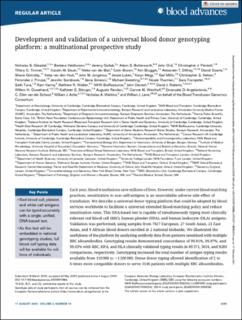Development and validation of a universal blood donor genotyping platform: A multinational prospective study
Gleadall, Nicholas S.; Veldhuisen, Barbera; Gollub, Jeremy; Butterworth, Adam S.; Ord, John; Penkett, Christopher J.; Timmer, Tiffany C.; Sauer, Carolin M.; Van Der Bolt, Nieke; Brown, Colin; Brügger, Kim; Dilthey, Alexander T.; Duarte, Daniel; Grimsley, Shane; Van Den Hurk, Katja; Jongerius, John M.; Luken, Jessie; Megy, Karyn; Miflin, Gail; Nelson, Christopher S.; Prinsze, Femmeke J.; Sambrook, Jennifer; Simeoni, Ilenia; Sweeting, Michael; Thornton, Nicole; Trompeter, Sara; Tuna, Salih; Varma, Ram; Walker, Matthew R.; Danesh, John; Roberts, David J.; Ouwehand, Willem H.; Stirrups, Kathleen E.; Rendon, Augusto; Westhoff, Connie M.; Di Angelantonio, Emanuele; van der Schoot, C. Ellen; Astle, William J.; Watkins, Nicholas A.; Lane, William J.
Journal article, Peer reviewed
Published version

View/
Date
2020Metadata
Show full item recordCollections
- Department of Informatics [978]
- Registrations from Cristin [10237]
Abstract
Each year, blood transfusions save millions of lives. However, under current blood-matching practices, sensitization to non–self-antigens is an unavoidable adverse side effect of transfusion. We describe a universal donor typing platform that could be adopted by blood services worldwide to facilitate a universal extended blood-matching policy and reduce sensitization rates. This DNA-based test is capable of simultaneously typing most clinically relevant red blood cell (RBC), human platelet (HPA), and human leukocyte (HLA) antigens. Validation was performed, using samples from 7927 European, 27 South Asian, 21 East Asian, and 9 African blood donors enrolled in 2 national biobanks. We illustrated the usefulness of the platform by analyzing antibody data from patients sensitized with multiple RBC alloantibodies. Genotyping results demonstrated concordance of 99.91%, 99.97%, and 99.03% with RBC, HPA, and HLA clinically validated typing results in 89 371, 3016, and 9289 comparisons, respectively. Genotyping increased the total number of antigen typing results available from 110 980 to >1 200 000. Dense donor typing allowed identification of 2 to 6 times more compatible donors to serve 3146 patients with multiple RBC alloantibodies, providing at least 1 match for 176 individuals for whom previously no blood could be found among the same donors. This genotyping technology is already being used to type thousands of donors taking part in national genotyping studies. Extraction of dense antigen-typing data from these cohorts provides blood supply organizations with the opportunity to implement a policy of genomics-based precision matching of blood.